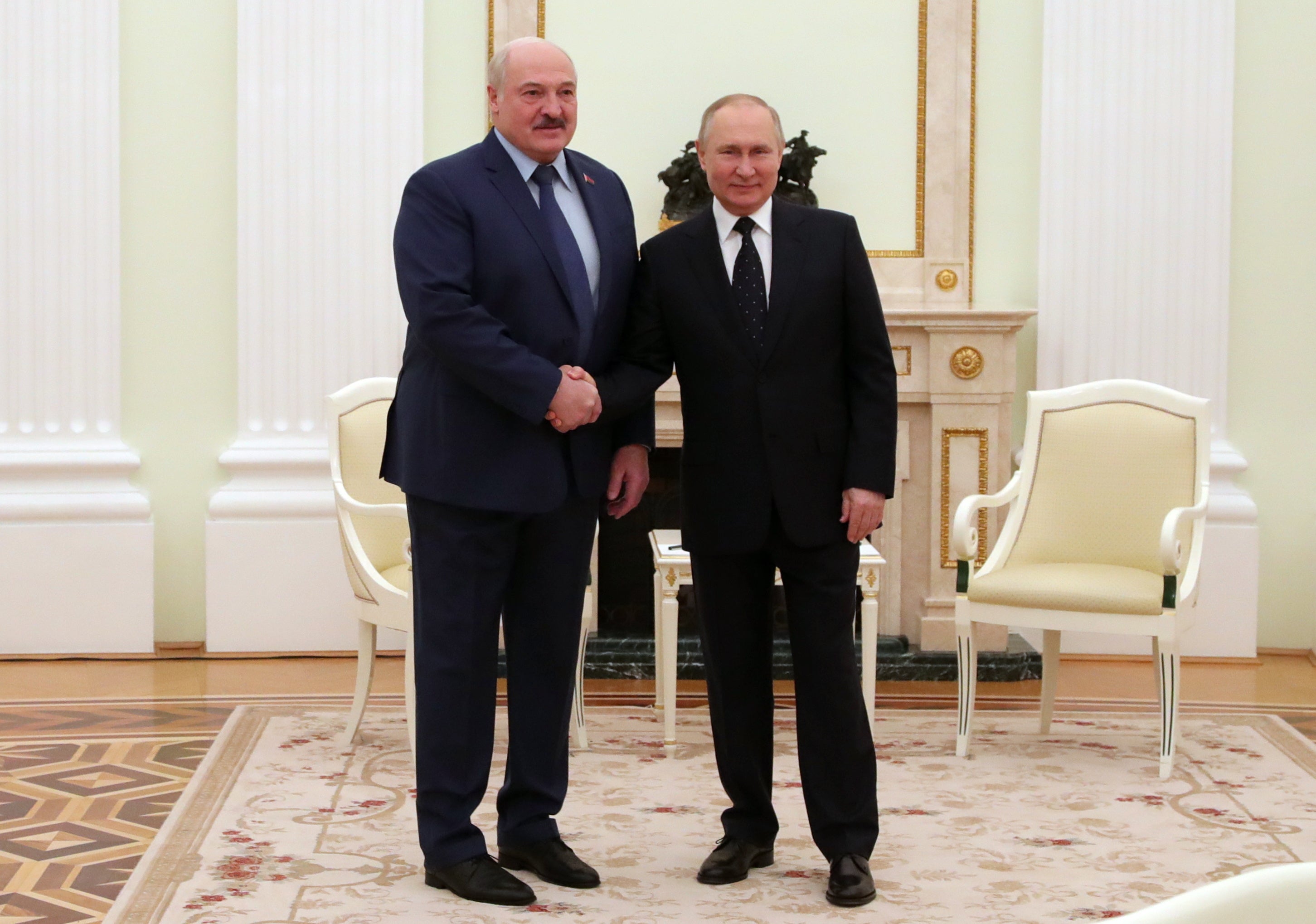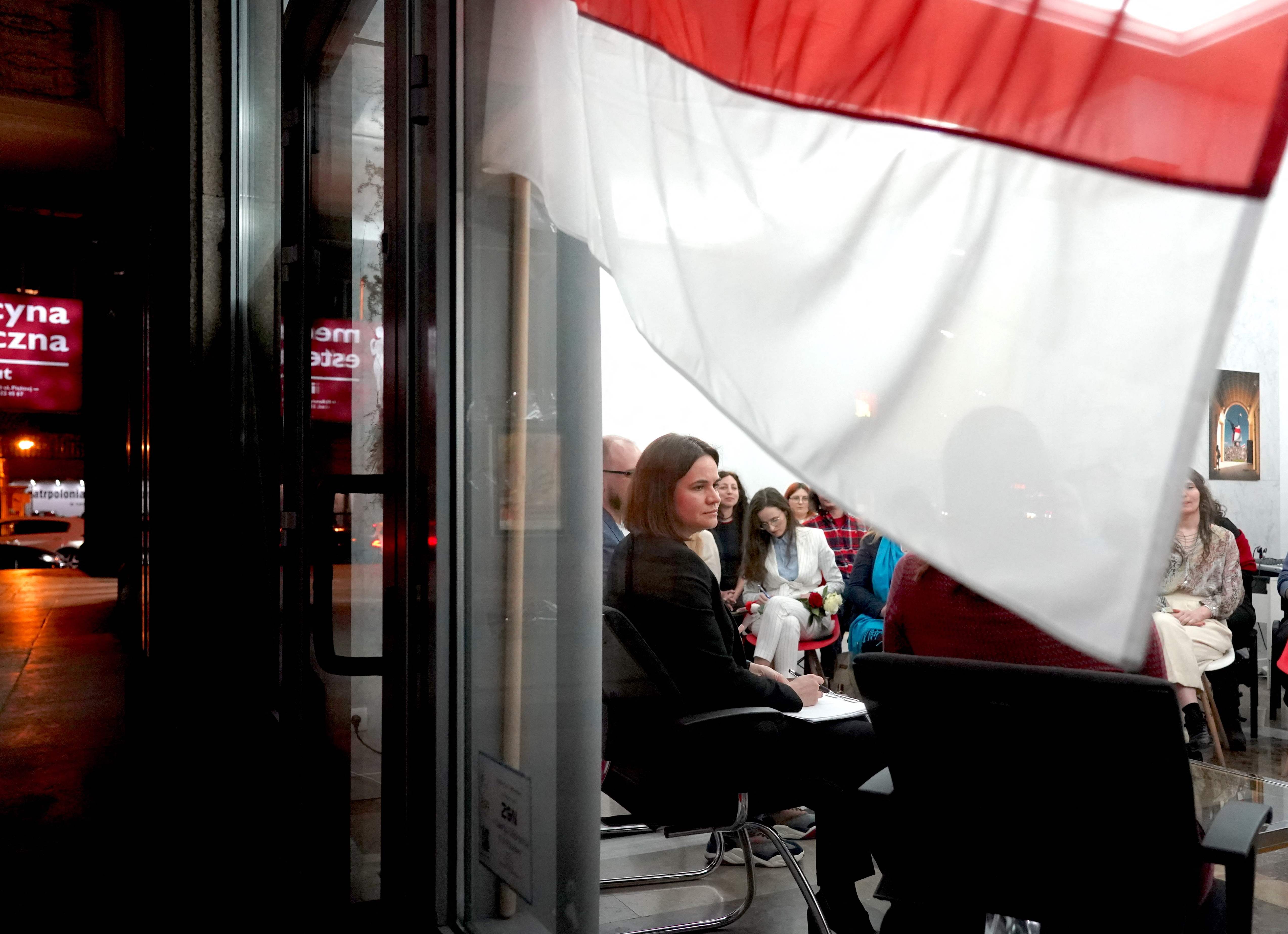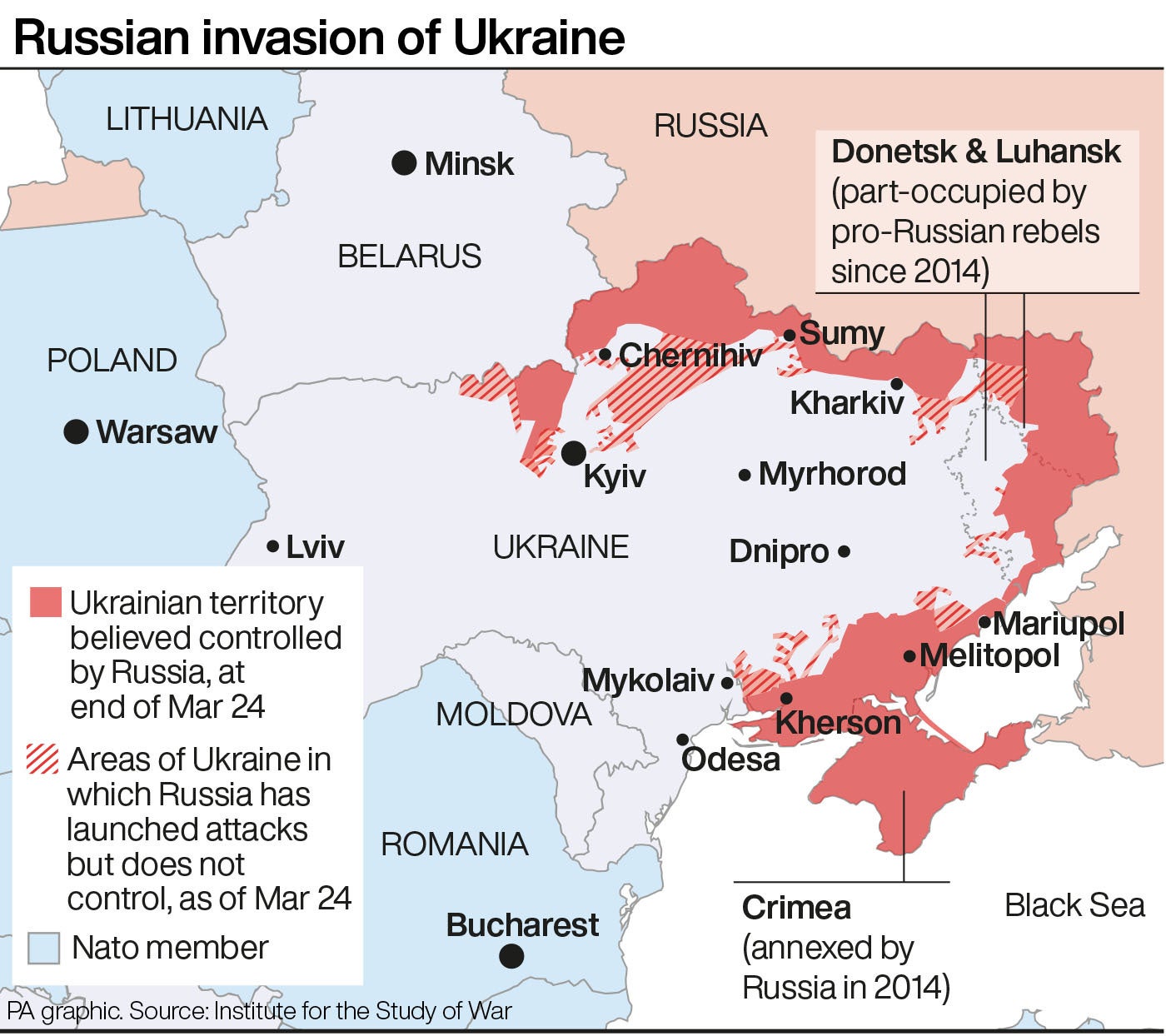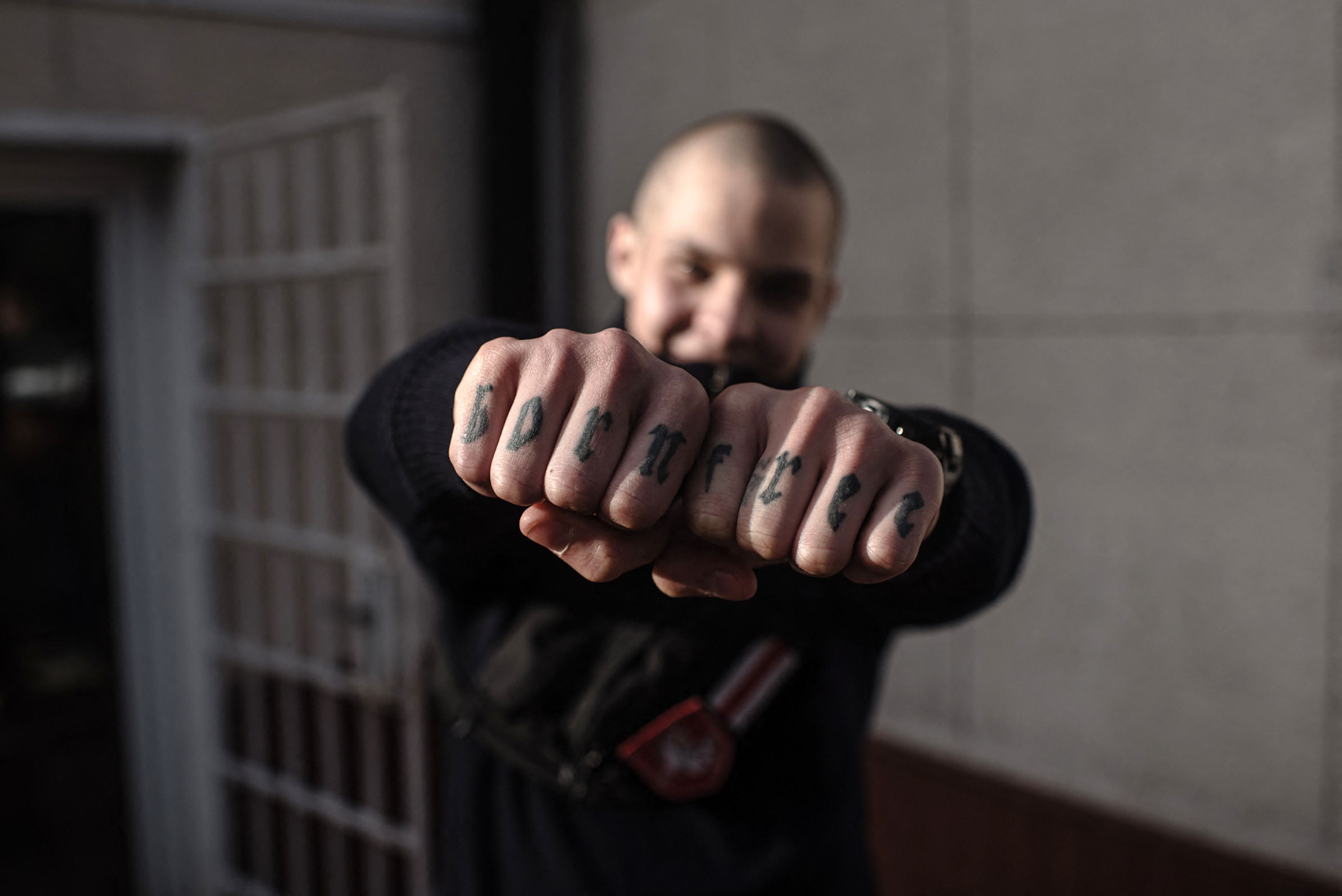Not just Ukraine: How the fate of Belarus is linked to the war between two of its neighbours
While President Lukashenko backs Putin’s war for his own survival, many Belarusians do not and the opposition movement is anxiously watching events in Ukraine, reports Amanda Coakley


When the Belarusian embassy evacuated its staff from Ukraine, the head of the border guard service, Serhiy Deyneko, had a parting gift for Minsk’s Ambassador Igor Sokol and his colleagues: 30 pieces of silver.
Since Russia’s invasion of Ukraine in late February, Belarus has played a Judas-like role, sacrificing the little sovereignty it had left to be used as a staging ground for the Russian assault on Kyiv.
Belarusian border guards have let Russian troops move through the frontier, the country’s air defence and traffic control systems have assisted Moscow’s campaign, and Russia’s dead and wounded have filled hospitals in southern Belarusian cities.
Still Belarus’s strongman leader Alexander Lukashenko has insisted his troops will not join the war despite Ukrainian intelligence saying on Monday that an attack from his men is likely. US and Nato officials have also briefed journalists that signs suggest Belarus could be preparing for a move on their neighbour.
For Belarus’s exiled opposition leader Sviatlana Tsikhanouskaya, the goal is to cut through Lukashenko’s propaganda and encourage Belarusians to obstruct and refuse any engagement with Russia’s war.
“People in Belarus understand that nobody asked them about this war, people don’t want to fight, people don’t want to be enemies to our brothers in Ukraine, but this is Lukashenko’s policy that he dragged our country into this,” she told The Independent from Lithuania’s capital Vilnius.
For Tsikhanouskaya and her colleagues much of their fate is linked to Kyiv.
Should Ukraine fall to Russia, it will be much harder to bring about the end of Lukashenko and his supporters in Minsk. Should President Volodymyr Zelenskiy’s men be victorious there will be a moment to reignite the momentum sparked after the fraudulent elections of 2020 where hundreds of thousands of people took to the streets of Belarus to protest against Lukashenko’s claims that he won 80 per cent of the vote.

“Our independence is under huge threat because with all the Russian troops on our territory it’s absolutely evident that illegitimate Lukashenka doesn’t control the situation anymore – the only thing he may control is repression against people,” said Tsikhanouskaya.
“If Ukraine should fail, and I hope that will not happen, Lukashenka’s line to the Kremlin will feel much stronger and our fight will be very difficult… but when Ukraine wins it will be much easier for people in Belarus to realise that we can change a lot in our country and we will have this window of opportunity.”
Since the invasion on February 24, hundreds of Belarusians have volunteered to defend Ukraine. Known as the Kalinousky Battalion after the ninth-century Belarusian revolutionary Kastus Kalinousky, they have engaged in an extensive social media campaign to encourage Belarusians from across the world to join them.
When Ukraine wins it will be much easier for people in Belarus to realise that we can change a lot in our country and we will have this window of opportunity
“Today the fate of our people is being forged in battles with the Moscow aggressor. With our blood we lay the foundation for freedom and the revival of our Motherland, a successful Belarusian breakthrough in the future,” they announced on social media.
Several other Belarusians have volunteered in the extensive humanitarian relief effort throughout Ukraine, arguing they would not leave the country after being welcomed when they fled repression after the elections two years ago.
After walking a political tightrope between west and east since coming to power in 1994, Lukashenko had to surrender his political ambitions to Russian president Vladimir Putin in return for support to quell opposition protests of 2020.

Russia provided Belarus with financial support and even offered military assistance to the embattled leader. This led Lukashenko to brutally crack down on dissent. Today over 1,000 people are political prisoners in Belarusian jails.
“Lukashenko’s political survival depends on Vladimir Putin’s political survival… but Lukashenko has tried to tread very carefully and not engage directly, but already that is a matter of definition. But he knows the war is unpopular in Belarus and that it is doing nothing to get the trust of the population which he had already lost anyway,” said Dr Gwendolyn Sasse, an expert on Belarus and Professor at Humboldt University in Berlin.
“However, I think it’s a matter of time and if Putin thinks it’s necessary to use Belarusian troops, I don’t think Lukashenko can do anything against that.”
On Sunday, President Zelenskiy’s office said an attack from Belarus would likely focus on Ukraine’s western Volyn region. One month into the war Russian forces have focused on the north, south and eastern regions of the country, although a strike on the Yavoriv military base close to the Polish border killed 35 Ukrainian soldiers and wounded 135 others last week.

In recent days it appears parts of the Russian assault is stalling, and analysts fear Moscow could be regrouping before making another aggressive push into Ukraine.
“At the moment this looks like an operation pause where preparations take place for another assault that includes Belarus. The Russians haven’t been able to break through so they will want to rethink,” Daniel Hamilton, a senior non-resident fellow at the Brookings Institution, told The Independent. “What is coming is a continued period of volatility that will essentially render Europe a turbulent area.”
“The mindset of Belarusian people and Ukrainian people is absolutely different; Ukraine has experienced democracy, we have not. Many people have gotten used to living under a dictatorship and they struggle to see an alternative Belarus. They saw a glimpse in 2020 but they don’t know how to bring it about,” argues Tsikhanouskaya.
“But what we know is that the Belarusian people do not want this war.”
Join our commenting forum
Join thought-provoking conversations, follow other Independent readers and see their replies
Comments
Bookmark popover
Removed from bookmarks